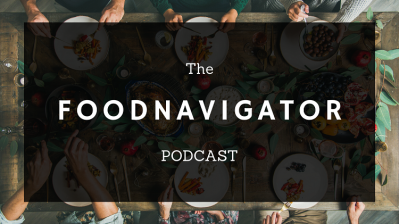Is interest in gut health propelling the pickled category? ‘Kimchi has moved into the mainstream’

The global fermented food and beverage market is bubbling. According to Meticulous Research, the market – which includes fermented vegetable products – is expected to reach more than $1000bn by 2030.
One of the reasons demand for foods such as sauerkraut, kimchi and pickles is growing links to increased awareness around gut health and the microbiome, according to Nick Vadasz, founder of Vadasz Pickles and Ferments - part of The Compleat Food Group.
Kimchi ‘in the consciousness’ of consumers
“There has been a lot of talk around gut health in recent years, and in fact, people think it’s a new trend,” Vadasz told FoodNavigator. But that’s far from the truth. Humans have been controlling the fermentation of food and beverages for thousands of years.
Kimchi, for example, a Korean dish of salted, fermented vegetables, was invented more than 3,000 years ago. Today, the kimchi market is also booming. Verified Market Research estimates the market to grow at a CAGR of 5.1% from 2023 through to 2030, to reach more than $5bn.
For Vadasz, who makes kimchi, alongside pickles and sauerkraut products, the traditional Korean dish has moved into the mainstream. “It’s through the door and it’s shut it behind it…It’s in the consciousness of consumers.”
More and more, consumers understand the relationship between fermented vegetables and gut health. Even when Vadasz first started selling his fermented products, some consumers were already aware of potential links between the microbiome and health benefits, including improved immunity. But more recent scientific research is also increasing this understanding.
Research out of Stanford University, for example, has found that a 10-week diet high in fermented foods boosts microbiome diversity and improves immune responses. Foods consumed during the study included yoghurt, kefir, fermented cottage cheese, kimchi and kombucha tea.
“Microbiota-targeted diets can change immune status, providing a promising avenue for decreasing inflammation in healthy adults,” said study co-author Christopher Gardner, director of nutrition studies at the Stanford Prevention Research Center, at the time.
And new initiatives, such as the ZOE project – which aims to understand how food affects the body by analysing gut, blood fat, and blood sugar responses – is also helping to drive consumer interest in gut health and fermented foods, suggested Vadasz. “But it’s been there in the background for years.”
The ‘magic’ of fermentation
Indeed, Vadasz himself grew up around fermentation. His grandmother used to leave half a bottle of milk in the sun, allow it to ferment, and when it was ‘sour’ and ‘yoghurty’, drink it. “And she lived to 93!” he said. “But it wasn’t talked about. It was discrete. And we do that with a lot of foods in a lot of cultures.”

Vadaz started his fermenting and pickles business at a small scale. Now that he sells into mainstream retail at a larger scale, how does he ensure the gut health-promoting microbes reach consumers’ large intestines – home to the gut microbiome?
The trick is to maintain the same fermentation processes, but at scale, the Vadasz founder explained. “We used to make it in little barrels, in small batches. We do it exactly the same way now, but just on a bigger scale.
“It’s the same processes that’s been done for thousands of years. That process of anaerobic lactic acid fermentation is tried and tested. And it works.”
In fact, it works on ‘many levels’. The process extends shelf-life, lowers the pH to ensure food safety, and adds flavour through the ‘magic’ of fermentation. “I know it’s scientific, but I still call it magic,” Vadasz told this publication. “Because it is an incredible transformation that happens to vegetables during the fermentation process, and it allows all that healthy bacteria to remain.”
Vadasz distinguishes itself in the supermarket by selling in the chilled aisles. Being a live, unpasteurised, naturally fermented product, it must be kept chilled, he explained. “When you see…products in the ambient aisles, that’s when you know it’s been pasteurised. That’s the difference.”
Taste first, health is a bonus
The other factor driving increased interest in fermented foods likely links to globalisation, suggested Vadasz. “With this global world, everything is linked. We’re on the internet, we know so much more about other people’s food cultures [such as Korean kimchi culture], and I think that’s a really important [factor] driving this.”
Kimchi particularly, he explained, ticks a lot of boxes. Ingredients ranging from garlic to ginger, and chilli, and their associated benefits, ‘adds extra value’.
And, of course, ‘it tastes so good too’. It’s not all about the gut health benefits, he stressed, adding that improving gut health was not the primary driver behind his pickles and ferments business.
“I started fermented food and making pickles purely from a chef’s point of view. I wanted to make great products that tasted really good. The bonus, that it turns out they’re healthy and food for you, is fantastic.”
Source: Cell
‘Gut-microbiota-targeted diets modulate human immune status’
Published August 2021
DOI: https://doi.org/10.1016/j.cell.2021.06.019
Authors: Hannah C. Wastyk, Gabriela K. Fragiadakis, Justin L. Sonnenburg et al.
You can listen to FoodNavigator's full interview with Nick Vadasz, founder of Vadasz Pickles and Ferments - part of The Compleat Food Group - on The FoodNavigator Podcast here, or wherever you access your podcasts.



























